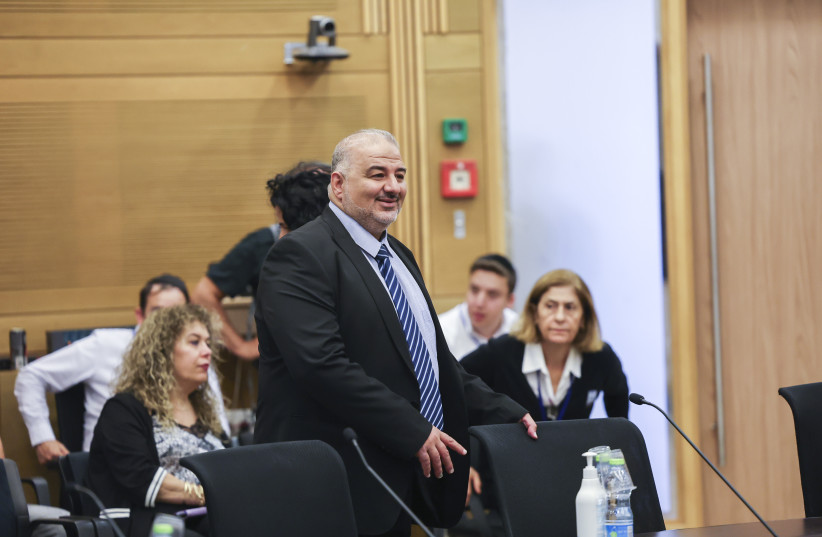The Joint List’s three factions, Hadash, Balad and Ta’al, reached an agreement this week on a joint run. However, drama broke out on Thursday evening, after Balad led by MK Sami Abou Shahadeh suddenly backed out of the agreement, and reportedly demanded the number one spot on the list, and do refused to a rotation agreement regarding the sixth spot.
The two parties finally broke apart in what became an extraordinary last-minute turn of events that could affect the entire election.
The left-wing Labor and Meretz parties handed in their Knesset lists for the upcoming election separately on Thursday, ending months-long speculation and attempts by Prime Minister Yair Lapid to force them to merge.
“There is one party fighting for truth of all of us,” Labor MK Naama Lazimi said after handing in the party’s list. “Opposite the darkness that Netanyahu and Smotrich are promoting against women, equality, core studies, LGBT and the justice system, Labor stands and fights for equality, for a fair society and economy, for a diplomatic process [with the Palestinians], for democracy, for Zionism, for Israel as a Jewish and Democratic state.”
Lapid reportedly even promised both parties to save spots on the Yesh Atid list for MKs who do not make it into the Knesset as a result of the merger. Meretz was willing to entertain the idea, but Labor leader Merav Michaeli refused to consider the merger, arguing consistently that the two parties' combined strength would grow if they ran separately.
The two parties, which have been averaging between four and six seats in the polls, will now fight to remain above the electoral threshold of 3.25% of the general vote.
The rest of Israel’s political parties finished handing in their Knesset lists at midnight on Thursday, clearing the last hurdle before the nation heads to the voting booths on November 1.

Standing parties register their lists
The parties currently sitting in the Knesset that handed in their lists included what are projected to be the two largest parties, Likud and Yesh Atid; the two haredi parties, United Torah Judaism and Shas; the Arab Ra’am party; and Labor and Meretz. The National Unity, Yisrael Beytenu and Religious Zionism parties handed in their lists on Wednesday.
Other notable parties to hand in lists were Bayit Yehudi, led by new leader Ayelet Shaked; former Yamina MK Abir Kara’s Economic Freedom party; 20-year-old media sensation Hadar Muchtar’s “Flaming Young” Party (Tze’irim Bo’arim); and more.
Bayit Yehudi only agreed officially to run under Shaked on Wednesday night. Shaked will lead the list, followed by Bayit Yehudi faction leader and current mayor of Givat Shmuel, Yossi Brodny.
The fourth spot on the list is reserved for lawyer Nitzana Darshan-Leitner. It remained unclear at press time who would occupy the third spot: former Religious Kibbutz Movement secretary-general Amitai Porat, or Yamina MK Yomtob Khalfon.
Shaked previously formed the Zionist Spirit party along with Communications Minister Yoaz Hendel, but broke off the partnership on Sunday.
The days leading up to the deadline included a scurry of other final agreements and decisions between factions that joined together into one list, including UTJ and the Joint List.
Former prime minister Benjamin Netanyahu also finalized his list on Wednesday, and announced his choices for the spots reserved for him – 14, 16, 28, 37 and 43. The choices were former Yamina MKs Idit Silman and Amichai Chikli, former deputy head of the Police Investigations Department Moshe Saada, author, journalist and community activist Tsega Melaku, and lawyer Yossi Fuchs.
UTJ only published its final list on Thursday morning after its two factions, Lithuanian Degel Hatorah and hassidic Agudat Yisrael, sparred for weeks over hasidut Belz, part of Agudat Yisrael, which agreed to enter an Education Ministry program that “Degel” strongly opposed. The list ended up as expected, with Agudat Yisrael leader Yizhak Goldknopf occupying the first spot, Degel leader MK Moshe Gafni the second, with the rest of the list arranged in a “zipper” alignment with the parties trading off.
According to the original deal, of the top six spots, Hadash, led by MK Ayman Odeh, received spots one, four and five, Ta’al led by Ahmad Tibi received No. 2, and Balad received spots three and number six as a three-way rotation beginning with Balad. The party is not expected to receive more than six seats. The factions decided that they would not only support a prime ministerial candidate who promises to initiate negotiations with the Palestinian Authority on a two-state solution, cancel the Nation-State Law, and other demands.
Ra’am’s top four included party leader MK Dr. Mansour Abbas, MK Walid Taha, Walid al-Hawashla and MK Iman Hatib Yasin. The top four is the same as the party’s current MKs save for al-Hawalsha replacing MK Mazen Ghnaim.
After handing in its list, Yesh Atid announced statistics regarding its party list that contained 47% women, three in the top five. The list also includes two former IDF major-generals, two former Israel Police assistant chiefs, and a former deputy chief of the Mossad. Forty percent of the party defines itself as traditional or religious, and three belong to the LGBT community, the party said.
However, Yesh Atid had a rough day on Thursday. A Likud MK published that the Yesh Atid’s website in Russian included a sentence saying that the Likud was a “sectorial Sephardi” party. Yesh Atid said that the sentence was put up by someone who was not authorized to do so, and that it would investigate the issue.
The party also lost a lawsuit to the Likud over pictures that the campaign used of Lapid with IDF soldiers on a number of occasions since becoming prime minister. The head of the Central Election Committee, High Court Justice Yizhak Amit, ruled that the pictures need to be taken off the web. Yesh Atid was fined NIS 40,000.
